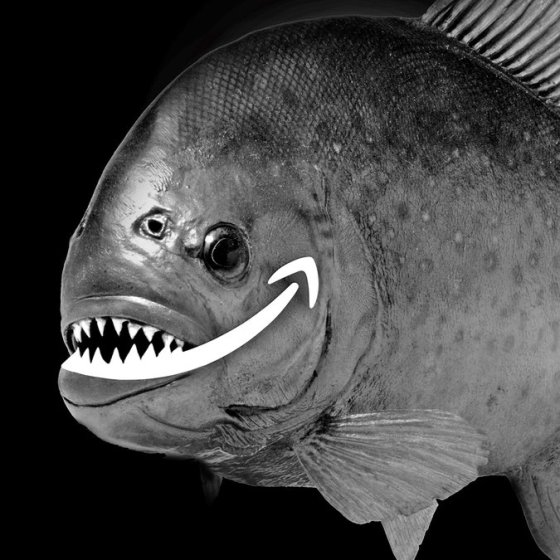
Vanity Fair:” The war is really about the future of publishing—and maybe of culture.” Photo Illustration by Stephen Doyle
New Post Goes Up Every Wednesday at 8:30 pm ET
WHITHER THE BOOK?
Amazon v. Hachette. The December 2014 issue of Vanity Fair contains an article, “The War of the Words”, by By Keith Gessen.The intro gives a good summary of the present state of affairs between Amazon and Hachette,
Amazon’s war with publishing giant Hachette over e-book pricing has earned it a black eye in the media, with the likes of Philip Roth, James Patterson, and Stephen Colbert demanding that the online mega-store stand down. How did Amazon—which was once seen as the book industry’s savior—end up as Literary Enemy Number One? And how much of this fight is even about money? Keith Gessen reports.
WHAT’S AT STAKE?
As Keith Gessen writes,
This past year has seen hostilities between Amazon and the publishers, which had been simmering for years, come out into the open, filling many column inches in The New York Times and The Wall Street Journal, not to mention numerous online forums. The focal point of the dispute has been a tough negotiation between Amazon and the publisher Hachette, with some public sniping between the companies’ executives (who have otherwise kept out of view). Hachette, it should be said, is no slouch: it is owned by the large French media conglomerate Lagardère. The other big publishers are similarly well backed. HarperCollins is owned by Rupert Murdoch’s News Corp. Simon & Schuster is a part of CBS. Macmillan and Penguin Random House are owned, or co-owned, by hefty German corporations. Nonetheless, all the publishers feel bullied by Amazon, and Amazon, in turn, feels misunderstood.
WHAT’S THE PROBLEM WITH $9.99?
When the Kindle was introduced, Amazon announced that the price of new books would be $9.99. As Gessen writes,
The heart of the matter was that it was so much less than $28, the average price of a new hardcover book. Another problem with $9.99 was just how close it was to $7.99 or $6.99. Publishers believed that Amazon would eventually go even lower, putting intolerable price pressure on print books and the places that sold them. With print gone, what exactly would publishers be left with? They could still select and edit and market books, but their chief task, getting the books into stores across the land, would be eliminated.
 A MONOPOLY? SO WHAT?
A MONOPOLY? SO WHAT?
A good explanation of the “So What?”, was written by Bob Kohn in an op-ed article appearing in the New York Times on May 30, 2014, “How Book Publishers Can Beat Amazon,”
“If you wish to understand what’s really happening between Amazon and Hachette — and, indeed, all the major book publishers — you need to know the meaning of the word monopsony.
The Supreme Court justice Sonia Sotomayor, when sitting on a lower court, once described monopsony as the “mirror image” of monopoly. Unlike a monopoly, which occurs when a seller of goods has the power to unlawfully raise prices of what it sells, a monopsony occurs when a buyer of goods has the power to unlawfully lower the prices of what it buys. Each violates antitrust laws: As the Supreme Court has long recognized, they both result in a misallocation of resources that harms consumers and distorts markets.
Take the e-book market, dominated by Amazon, which buys what a federal court once found to be 90 percent of all e-books sold in the United States. The monopsony power of Amazon, which has a current market share of 65 percent of all online book units, digital and print, is not just theoretical; it’s real and formidable. When Macmillan, the fifth largest book publisher, displeased Amazon in 2010 by proposing certain changes in business terms, Amazon exercised what has been described as its “nuclear option”: It promptly deleted the “buy” buttons in the Amazon online store for all of Macmillan’s books. In an instant, Macmillan’s entire business was in jeopardy.”
Credit Jennifer Heuer; Photograph by byllwill/Getty Images
“With a major publisher out of the market for new manuscripts, authors would receive less money. And less money would mean fewer authors, and fewer books. (Nor are self-published authors safe from the power of a monopsony: While a traditional publisher like Macmillan needs an author’s consent to change the terms of his or her publishing agreement, Amazon reserves the right to change any provision of its agreement with any author at any time for any reason.)
How did Amazon attain such monopsony power? By providing valuable services? Perhaps, to some extent. But consider that from the moment it introduced its Kindle product, Amazon sold e-books at prices far below what it was buying them for. If Amazon bought an e-book from Hachette for $13, it resold it to a consumer for $9.99, losing $3.01 per e-book. It should come as no surprise that under these circumstances, e-book buyers flocked to Amazon.
But there was a problem. When a company has dominant market power and sells goods for below marginal cost, it is engaging in predatory pricing, a violation of federal antitrust laws.”
WHERE DOES THE BOOK GO FROM HERE?
Book, Publisher, Seller, You. The story is a long an continuing one. Just read the rest of the Vanity Fair Article. Stay tuned.
UPDATE: NYT
|
|